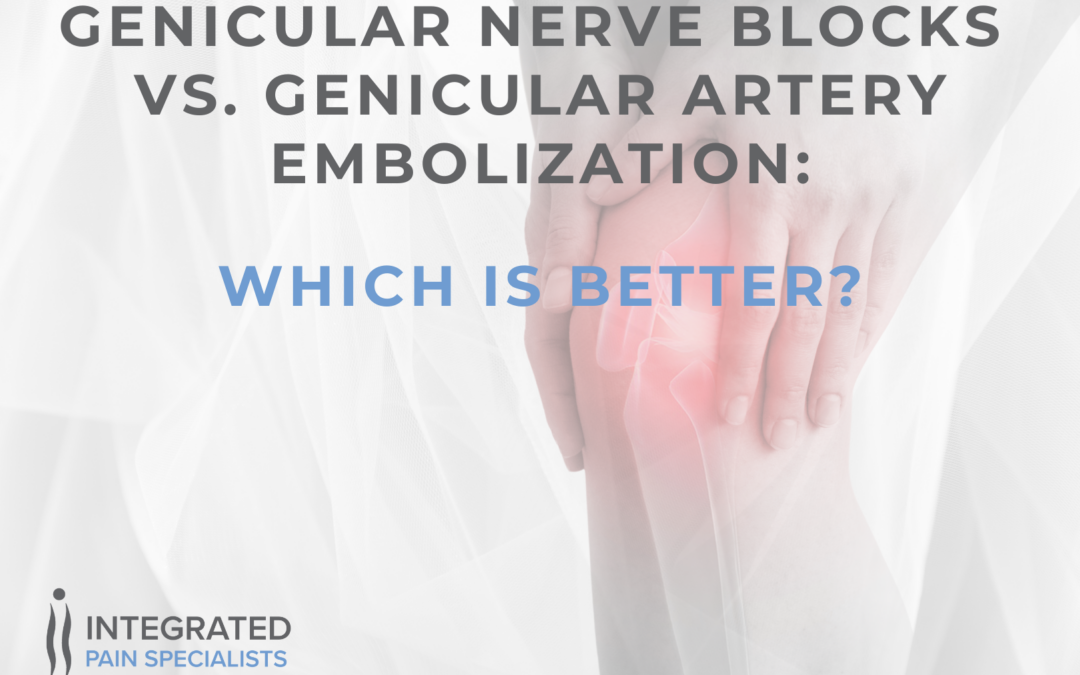When it comes to treating chronic knee pain, particularly for conditions like osteoarthritis, both genicular nerve blocks (GNB) and genicular artery embolization (GAE) offer innovative, non-surgical solutions. While both treatments target the knee area, their mechanisms differ significantly, and GAE may present some notable advantages.
What Are Genicular Nerve Blocks?
Genicular nerve blocks involve injecting a local anesthetic near the genicular nerves in the knee to block pain signals. This minimally invasive procedure offers temporary pain relief, particularly for those suffering from chronic knee pain who have not responded to other treatments like physical therapy, anti-inflammatory medications, or corticosteroid injections.
Benefits of Genicular Nerve Blocks:
- Non-surgical: This is a quick, outpatient procedure that does not require anesthesia.
- Immediate Relief: Patients often experience pain relief shortly after the injection.
- Diagnostic Tool: If the nerve block works, it indicates that the genicular nerves are the source of pain, guiding further treatment.
- Short-Term Relief: The relief can last from a few weeks to a few months.
However, GNB only offers temporary relief, and repeated procedures are often necessary. Radiofrequency ablation (RFA) may be recommended if long-term relief is sought, which uses heat to disrupt nerve signals for several months of pain relief. Nevertheless, GNB does not address the underlying cause of knee pain—inflammation.
What Is Genicular Artery Embolization (GAE)?
Genicular artery embolization (GAE) is another minimally invasive procedure designed to treat knee pain, particularly for those suffering from osteoarthritis. Unlike GNB, which focuses on nerves, GAE targets the arteries supplying blood to the inflamed areas of the knee joint. By reducing blood flow, inflammation is minimized, which in turn reduces pain and improves mobility.
The procedure involves inserting a small catheter into the arteries near the knee. The physician then injects tiny particles to block, or “embolize,” the arteries, which helps reduce inflammation and alleviate pain. is an outpatient procedure and typically takes 1-2 hours.
Benefits of GAE over GNB:
- Longer-Lasting Relief: GAE delivers longer-lasting relief, helping many patients experience pain reduction for months or even years.
- Target Inflammation: It effectively targets the inflammation caused by osteoarthritis, addressing the root of the pain by directly reducing the inflammatory response.
- Non-Surgical: Like GNB, GAE is a minimally invasive, outpatient procedure with minimal recovery time.
- Improved Mobility: By reducing inflammation, GAE can enhance the patient’s range of motion and overall knee function.
- Alternative to Surgery: For patients looking to avoid or delay total knee replacement, GAE offers a non-surgical option that can significantly improve pain and function.
Why Choose Genicular Artery Embolization (GAE)?
- Targeting the Root Cause of Knee Pain
While GNB addresses the symptoms of pain by blocking nerve signals, GAE goes a step further by targeting the underlying cause of osteoarthritis pain: inflammation. Osteoarthritis is a degenerative condition that often results in joint inflammation, contributing to pain, stiffness, and limited mobility. GAE reduces blood flow to these inflamed areas, providing lasting pain relief by reducing the inflammation that drives the discomfort. - Longer-Term Benefits
The pain relief provided by GAE tends to last longer than that provided by GNB. While nerve blocks provide temporary relief for a few weeks to months, GAE can offer relief for several months to even years in some cases. By directly addressing the inflammation, GAE allows patients to regain mobility and live with significantly reduced pain for a prolonged period. - Fewer Repeat Procedures
GNB often requires multiple injections or the use of radiofrequency ablation to achieve sustained relief. GAE, on the other hand, typically provides longer-term results with a single procedure, reducing the need for frequent visits to a specialist. - Improved Mobility
Inflammation in the knee joint limits the range of motion and contributes to stiffness. By reducing this inflammation, GAE not only relieves pain but also improves mobility, allowing patients to regain function in their knees. This makes it an excellent option for patients with osteoarthritis who have difficulty performing daily activities due to pain and stiffness. - Lower Risk Profile
Both GNB and GAE are low-risk, but GAE has fewer long-term complications. By targeting inflammation directly, GAE reduces the risk of nerve damage and side effects common with repeated GNB treatments. - Delays or Prevents the Need for Surgery
For patients with advanced osteoarthritis, total knee replacement surgery may eventually become necessary. However, GAE offers a non-surgical alternative that can delay the need for surgery, sometimes indefinitely. For patients who are either not surgical candidates or wish to avoid invasive procedures, GAE presents a highly effective option.
Conclusion: GAE as a Superior Option
When comparing genicular nerve blocks and artery embolization, it’s clear that GAE provides several advantages, particularly for osteoarthritis patients. While GNB offers temporary relief and diagnostic benefits, GAE offers longer-term results by addressing the root cause of the pain: inflammation. Patients who undergo GAE often experience months or even years of pain relief, improved mobility, and a better quality of life, all without the need for surgery.
If you are dealing with chronic knee pain and have not responded to other treatments, GAE may be the solution you’re looking for. At Integrated Pain Specialists, we specialize in both genicular nerve blocks and genicular artery embolization. We provide personalized treatment plans based on your specific needs. Contact us today to learn more about how GAE can offer you lasting relief and get you back to living your life without knee pain.
For more information, visit Integrated Pain Specialists.

